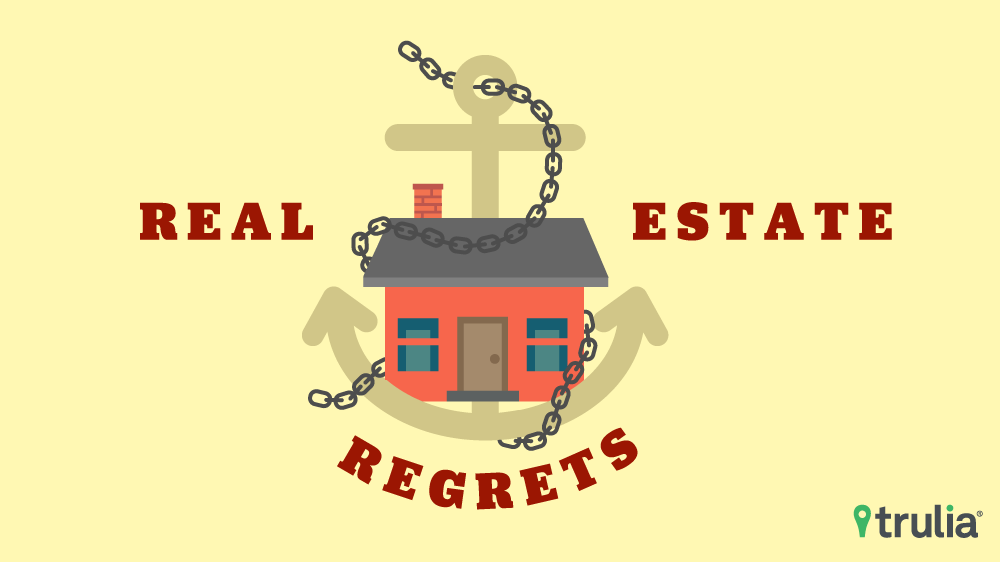Regrets? Oh yeah, we got ‘em.
America’s sentiment about housing has changed since home prices hit bottom in 2012. Hearts and minds are coming around: Americans feel more positive about homeownership, and overall regrets about housing choices have edged lower.
But the market’s wild ride has left scars since we last asked Americans what they shoulda, coulda and woulda done about their real estate decisions in 2013. Today, 44% of Americans have a regret about their current home or the process they went through to when choosing it, a slight decrease from 46% five years go. According to our June 2017 survey, conducted online by Harris Poll among 2,264 U.S. adults ages 18 and older:
- A majority of Americans, 62%, believe housing costs have become less affordable since 2012 – of which 26% say it is much less affordable.
- More than one in five Americans, 21%, say a housing purchase mistake they made in the past is now holding them back from changing their current housing situation.
- Even 26% of those with an annual household income of $100,000 or more – a level roughly 50% more than the median U.S. household income of $73,298 – believed they could not afford to buy a home in the current market.
- Among Americans who were involved in choosing their current home, the top regret among renters was deciding to rent instead of buying a home, 41%, while more homeowners wished they had chosen a larger home, 33%, – which are the same top regrets they had in 2013.
In this edition of our regrets survey, we examined real estate regrets from two angles. First, we compared the sentiments between those who moved into their current home before and after the bottom of the housing market in 2012.
Second, we asked Americans about debt. We found that even though many Americans feel they can’t afford to buy a home, they thought people should make mortgage payments a priority second only to paying off credit cards.
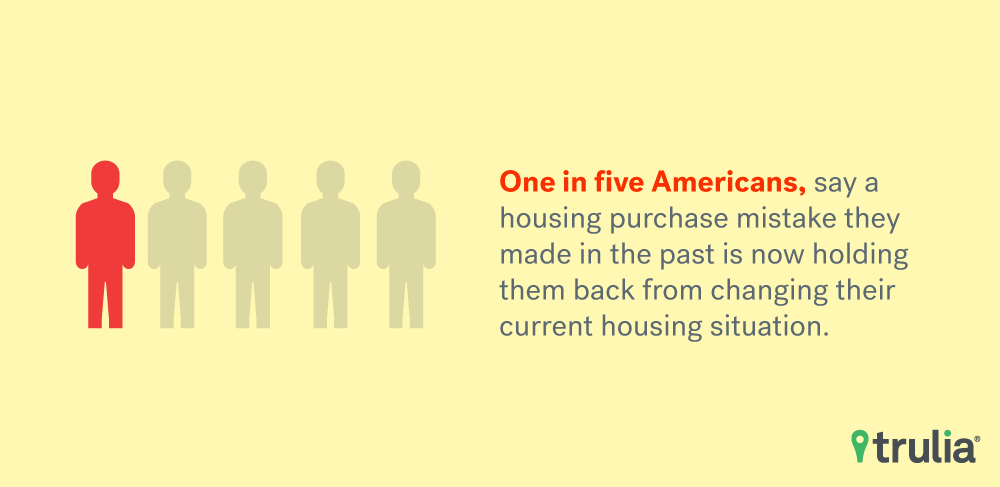
Today’s Renters Are More Negative About Homeownership
The gap between those that feel positively and negatively toward owning a home now compared to five years ago is much smaller for renters than for homeowners. One-third of renters, 33%, feel more positive about the idea owning a home than they did five years ago, but one-quarter of renters view home owning more negatively than they did five-years ago.
| Compared to five years ago, has your view towards owning a home become more positive or negative? | |||
| Renters | Homeowners | All | |
| Much/somewhat more positive | 33% | 42% | 38% |
| Much/somewhat more negative | 25% | 7% | 14% |
| Neither | 43% | 51% | 48% |
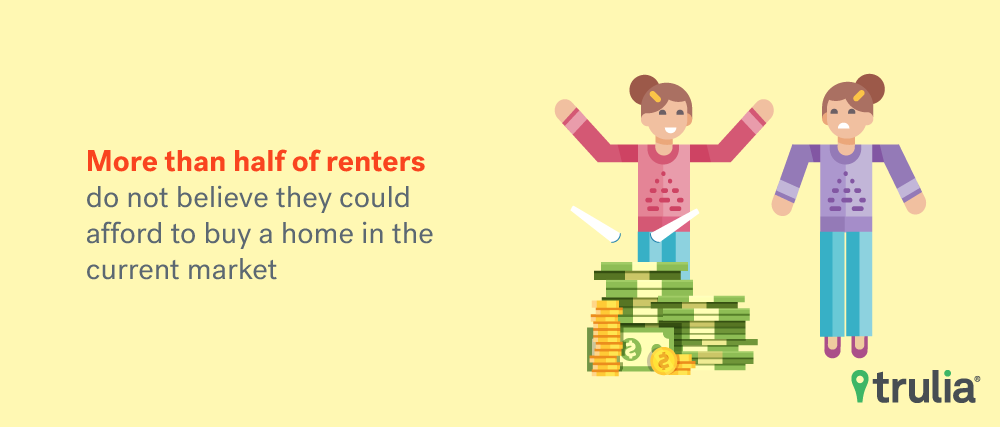
Drilling down into those who said they had a role in the process of selecting a home: Since 2013, the share of those expressing regrets when choosing their current home has decreased from 52% to 51%. The share of regretful renters dropped by four percentage points from 2013 to 2017. As for regrets regarding home size, just one in three renters who had any regrets about home size regretted not choosing a larger home compared to nearly 40% in 2013. Since 2013, a far smaller share of both homeowners (15% versus 22%) and renters (14% versus 21%) regretted not having enough information before deciding on their current home.
| Which of the following regrets, if any, do you have about your current home and the process you went through when choosing it?* | ||||||
| 2013 | 2017 | |||||
| Homeowners | Renters | All | Homeowners | Renters | All | |
| Have regrets about current home/process of choosing home | 50% | 56% | 52% | 51% | 52% | 51% |
| Wish they had chosen smaller/larger home | 46% | 49% | 47% | 42% | 38% | 41% |
| Larger home | 34% | 39% | 36% | 33% | 33% | 33% |
| Smaller home | 11% | 10% | 11% | 9% | 5% | 8% |
| Wish they had bought instead of rented | – | 42% | 23% | – | 41% | 13% |
| Wish they had more information before deciding | 22% | 21% | 22% | 15% | 14% | 15% |
| Wish they had done more/less remodeling | 32% | – | 10% | 26% | – | 16% |
| * Responses are from those who said they were involved in decision-making process | ||||||
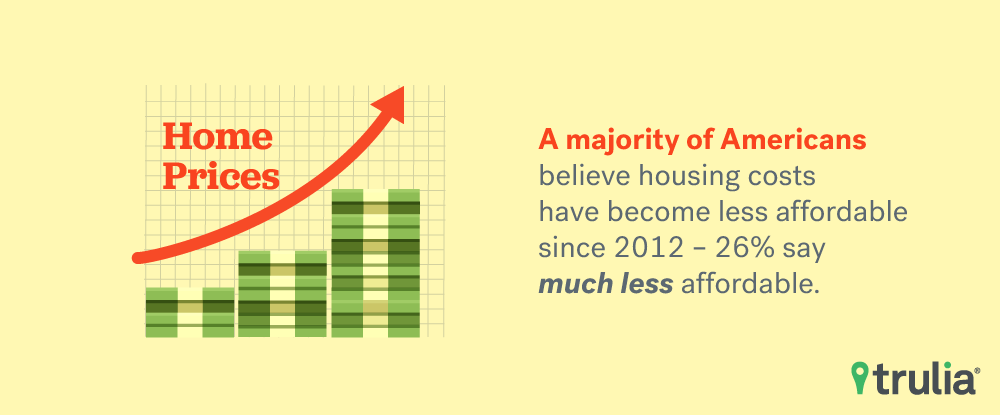
Millennials Most Likely to Have the Most Regrets, Retiree-age Americans, Less So
First, the good news: when it comes to owning a home, more Americans tend to be more positive, 38% than negative, 14%, compared to five years ago. Nearly half, 48%, said they haven’t changed their view. Between renters and homeowners, the gap between those who felt more positive and more negative than five years ago was much smaller for renters. In fact, a third of renters, 33%, felt more positive about homeownership – even though only 30% said they could afford to buy a home today.
When Americans moved into their current home also may have influenced their views. Those who did so recently, after 2012, were more likely to see homeownership as more positive, 41%, compared to those who moved into their current home before the bottom, 37%.
Eighty-four percent of those who moved into their current home on or before 2012 were glad they didn’t buy a (non-foreclosed) home compared to 57% of those that moved into their current home after 2012.
Leading the positive vibe were millennials (ages 18 to 34): 48% said they had a somewhat more positive view since the housing market bottom. When it comes to negative sentiments, older women, ages 55 to 64,are more likely than men of the same age to share this view: 22% of those women said their view of homeownership is more negative than it was 5 years ago (compared to 13% of men), and roughly the same proportion, 24%, view it more positively.
| Top Real Estate Regrets By Age* | |||
| ALL | 18-34 Year Olds | 65+ Years Old | |
| Have any regrets about current home/process they went through when choosing it | 51% | 71% | 28% |
| I wish I had bought instead of rented. | 21% | 28% | 11% |
| I wish I had chosen a larger home. | 17% | 29% | 8% |
| I wish I had done more remodeling when I bought the home than I did. | 12% | 24% | 5% |
| I wish I had been more financially secure before I decided. | 9% | 17% | 5% |
| * Responses are from those who said they were involved in decision-making process. | |||
Since the Housing Market Bottom, More Regrets
Whether they were involved in the home selection decision or not: Americans who found their homes after the U.S. housing market bottom in 2012, were more likely to have regrets. Half, 50%, said they had regrets, compared to 42% of those who found their home before 2012. The biggest distinction between pre-bottom and post-bottom home seekers? Being financially secure: 12% of those who got their current home after 2012 said they wished they had been more financially secure before they decided, compared to 6% of Americans who found their home in 2012 or prior.
No regrets: 93% of those who got a home before 2012 held onto it. A strong majority, 82%, of those who moved into their current home before the bottom were glad they didn’t sell in the last five years. While 72% of Americans who moved after 2012 say they haven’t sold in the past 5 years, and just 60% are glad they haven’t sold.
More Income, Likely to Have Regrets
Surprisingly, whether Americans had regrets about getting their current home seems to have been influenced by income – that is, if they made more, they were more likely to have regrets. Half of Americans involved in the home selection process, 50%, and who make $100,000 or more annually had housing regrets, compared to 44% overall and just 40% of those who made less than $50,000 annually. Home size was the biggest regret. One in five high-income Americans (20%) wished they had a larger, 16%, or smaller, 4%, home.
High-income homeowners were also more likely to regret not putting more money down on a house, 12% vs. 4% overall whose annual household income is less than $50,000.
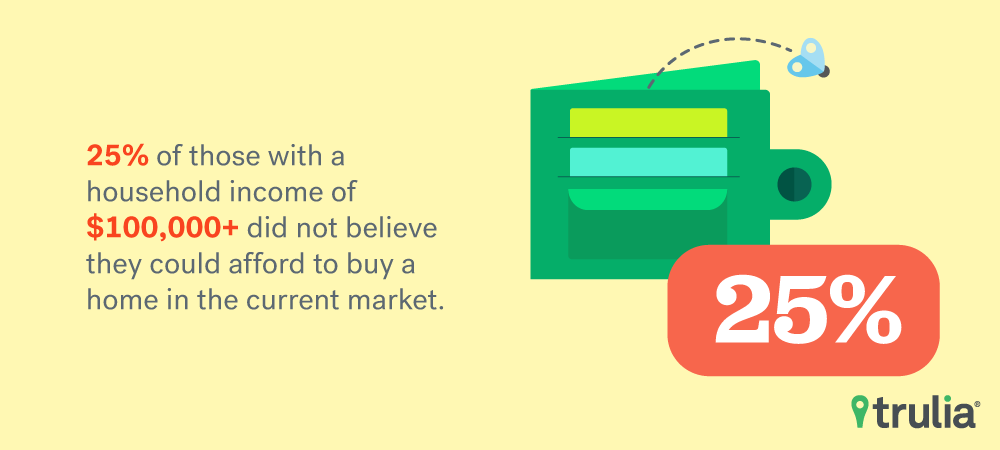
Got Kids, Got Regrets
Unlike other households, parents tended to express more regrets about neighborhood choice than those that who are not parents of children under the age of 18. Nearly twice the share of parents of children under the age of 18, who were involved in the home selection process, compared to those who were not parents of young children (9% vs. 6%) wished they had more information about the neighborhood before they decided on their current home. Specifically, 13% of parents of school-aged children wished they had chosen a neighborhood with better school, compared to only 1% of those who are not parents of children under 18.
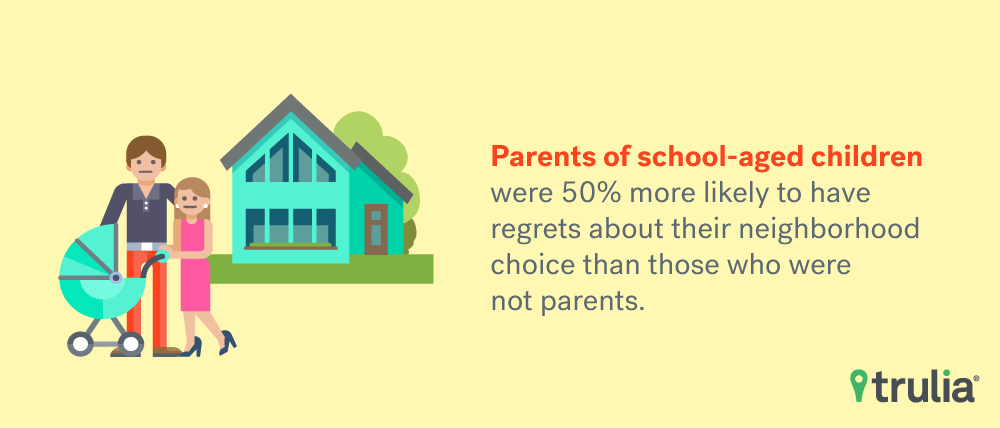
After Credit Cards, Most Say Mortgage Debt Should Be Paid First
When it comes to debt and housing, more Americans think it’s more important for borrowers to pay off credit card debt first (40%). That’s something personal finance experts say is the right choice given credit cards’ high interest rates. But home loans, specifically mortgages, rank as a close second (28%) as a priority for Americans – which are considered good debt and expected to be carried over a long period of time.
Though the findings may not seem surprising at first, they aren’t necessarily smart personal finance. Mortgage and student loan debt carry low interest rates. Experts say these debts are inexpensive to carry. So, for anyone to suggest that paying these debts ahead of credit card debt is concerning.
Also, consider that since the recession, costly credit card debt has risen 11% to $760 billion from $860 billion, according to the most recent household debt survey by the Federal Reserve Bank of New York. Likewise, student loan debt has more than doubled to $1.34 trillion nationally from $640 billion during the same span.
Meanwhile, mortgage debt was about $9.9 trillion in the third quarter of 2008. It’s now dropped 8% to $9.1 trillion in the first quarter of 2017.
| In your opinion, what type of debt do you think borrowers should prioritize paying first? | ||||||
| Loan Type | 18-34 year olds | Annual HH income less than $50k | High school education or less | Students* | Renters | All |
| Credit card | 30% | 31% | 31% | 16% | 30% | 40% |
| Mortgage | 30% | 30% | 35% | 34% | 30% | 28% |
| Student Loan | 12% | 6% | 4% | 32% | 7% | 7% |
| Home Equity | 6% | 4% | 3% | 2% | 6% | 4% |
| Auto | 4% | 3% | 2% | 1% | 3% | 3% |
| Other Loan | 1% | 2% | 1% | 1% | 2% | 1% |
| Not Sure | 18% | 23% | 24% | 13% | 21% | 17% |
| * the base size for students is extremely low (n=56) to be considered a representative sample – this data should be considered qualitative and directional in nature. We have included student responses for informational purposes only. | ||||||
Homeownership Is a Risk, but Most Still Feel It’s Worth It
Though many Americans may have been burned by a housing decision in the past, or view today’s market as unaffordable, they by and large still believe homeownership is something for which to strive. When choosing any home – either bought or rented – Americans should be keen to avoid the issues that most commonly lead to regrets: picking the wrong size home, failing to get enough information about the home and neighborhood and, ultimately, making the right choice when it comes to buying or renting.
Methodology
The 2017 survey was conducted online within the United States by Harris Poll on behalf of Trulia from June 28-30, 2017 among 2,264 U.S. adults ages 18 and older. The 2013 survey was conducted online within the United States by Harris Poll on behalf of Trulia from March 22-26, 2013 among 2,130 U.S. adults ages 18 and older. These online surveys are not based on a probability sample and therefore no estimate of theoretical sampling error can be calculated. For complete survey methodology, including weighting variables, please contact mailto:dweidner@trulia.com.
